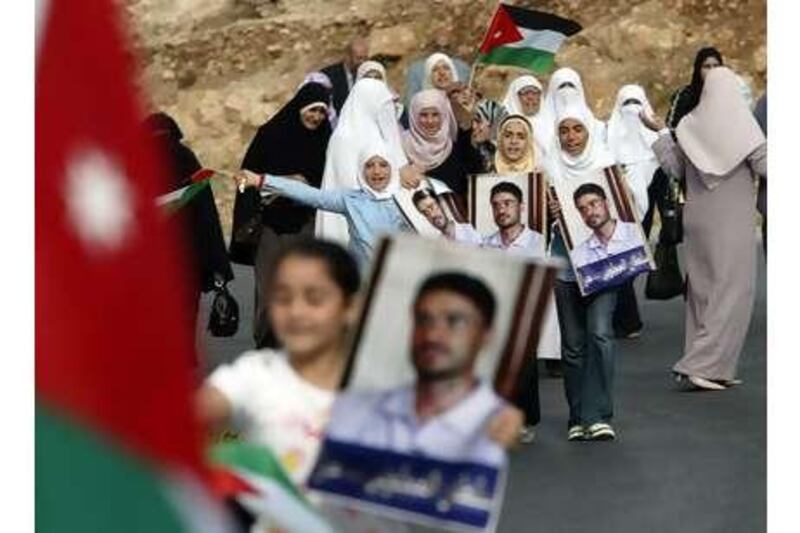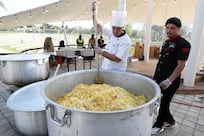AMMAN // Hundreds of Jordanians gathered outside the Gafgafa prison, 60km north of Amman, yesterday to celebrate the release of four Jordanian citizens who completed prison sentences in the country after being transferred from Israeli prisons 13 months ago. In emotionally charged scenes, women ululated and sprinkled flowers as family and friends distributed sweets to mark the release of Sultan Ajlouni, Khaled and Salem Abu Ghalyoun and Amin al Sanee. All four men had spent 17 years in prison in Israel for killing four Israeli soldiers in two separate attacks in 1990 - four years before Jordan and Israel signed a peace treaty.
Israel had refused to release the four saying they had "blood on their hands", but the men were finally handed to the Jordanians under pressure from King Abdullah II to serve out the remaining 18 months. Jordanian law stipulates that a month in jail is 21 days and prisoners can serve three-quarters of their term if they show good behaviour. Dressed in khaki, the four men walked out of the prison gates holding aloft the Jordanian flag to meet the crowds, who chanted "God is Great," and called for "the army of Mohammed to return".
The crowds marched, some holding the green flags of the Muslim Brotherhood, and others raising photos of King Abdullah. The mother of Sultan Ajlouni kissed the ground, grateful to see her son, who crossed over into Israel in 1990 and killed an Israeli soldier. "Eighteen years are enough ... now it is time to work in order to release all the other Arab prisoners in Israeli jails," Mr Ajlouni said. "This is a day of joy for us, but the happiness is not complete, not until the other prisoners are released," said Mr Ajlouni's brother, Saleh, who heads a national committee that follows up on prisoners in Israel.
"There is still a thorny issue as there is a huge number of prisoners in the jails of the Zionist occupation," he said. There are 28 Jordanians in prison in Israel and 25 other Jordanian nationals are listed as missing, according to the committee. Officials in Jordan's foreign ministry said about 20 were in Israeli jails, all imprisoned after the peace treaty. "We continue to follow up on their health and their situation. There are efforts ? and we are trying to reach an agreement with Israel to secure their release. And with our diplomacy we were able to release the four prisoners," said a foreign ministry spokesman.
Itai Bardov, a spokesman for the Israeli Embassy in Amman, said his country "explained to Jordan that we would have preferred to have their release postponed until the full 18 months are up". But he told The Associated Press the Jordanian decision would not affect relations and his government did not "see this as an anti-Israeli move". Some 30km away, in Muqabaleen, Mr Sanee arrived in a convoy of honking cars. His five sisters and new wife, Amal, beat drums, sang and ululated, while the men sat under a canopy, sipping bitter coffee.
"Thank God for the freedom, which is priceless," Mr Sanee said on his arrival. "Our joy will only be complete when Palestine is liberated." Asked about life in Israeli prisons, he said: "We suffered every day, even when it comes to the water that we drink or the air that we breathe. The Israelis even tried to make the windows smaller in prison to deprive us of air," he said. Mr Sanee, 42, met Amal, 24, at a family lunch when he was released for 24 hours to celebrate Eid al Fiter, the feast of breaking fast, last year. The two were married a few months later during another 24-hour leave to mark Eid al Adha, the feast of sacrifice.
Last year the Jordanians and the Israelis agreed that the four men could be freed at the same time that Israel releases other Arab prisoners with similar charges. But when the four remained in detention after last month's prisoner swap between Hizbollah and Israel last month, a public outcry grew. "Israel exchanged prisoners with Hizbollah and did not do the same with Jordan, with whom it had signed a peace deal," said Labib Qamhawi, a political analyst.
"This is really embarrassing because Jordan should be more important to Israel than Hizbollah. "Jordan did not want to be seen running in the shadow of Hizbollah." Some commentators have criticised the Hizbollah prisoner swap for sending a message that Israel responds to force before peace. The peace treaty that Jordan signed with Israel does not mention Jordanian prisoners. "Jordanians feel that the treaty was severely disadvantageous because too many issues should have been addressed, including that of the Jordanian prisoners," Mr Qamhawi said. "People believe that it was sealed without any serious consideration for the interest of the country and that's why they don't accept it till now," he said.
The foreign ministry spokesman defended the treaty, however. "Having peace between neighbouring countries benefits both. Jordan uses its ties with Israel to help the Palestinians and to push for efforts towards a peaceful settlement," a ministry spokesman said. @Email:smaayeh@yahoo.com





